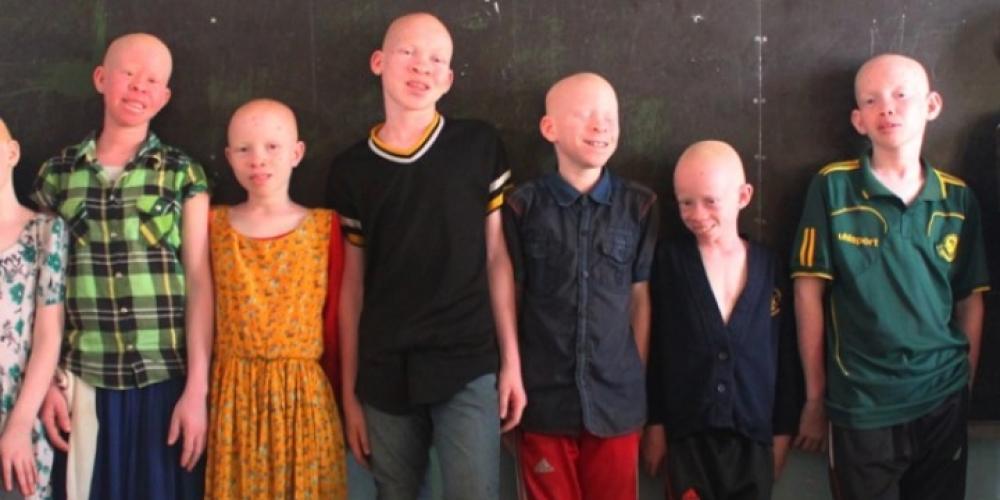
Most people are probably familiar with the precarious situation of those with albinism living in Tanzania. It’s a country with many belief systems, running side by side. Religions such as Christianity and Islam are popular across the country, but their believers are often infused with that other belief system: witchcraft. And albinism is not a good condition to have in a country where witchcraft is ever-pervasive.
Albinism is a congenital disorder characterised by the partial or complete absence of pigmentation in the skin, hair and eyes. With such highly visible traits and a condition that is immediately obvious at birth, there is no escaping being marked out as ‘different’ in Tanzania. People with albinism also suffer from sight problems and are at very high risk to sunburn and skin cancer.
Albinism is a hereditary condition where a defective gene is passed down from both parents to the child. The defect results in a lack of melanin production, or a reduced amount of it. However, the chances of having a baby born with albinism are, well, random. There is a possible reason pointing to a higher incidence of people with albinism in Tanzania; it is e.g. more prevalent in the Sukuma people, but the general thinking points to intermarriage within certain communities and tribes. In Tanzania, people with albinism more often than not are faced with severe societal challenges and threats. They are discriminated against, ridiculed, and often have to deal with fear and outright violence. Witchcraft is very often believed to be at the source of this behaviour, and it can lead to witchcraft-related killings or amputations, as body parts are used by witch doctors to make potions. [continue reading below picture]
Tackling the worldviews that seem to govern people’s thinking is hard. The government in Tanzania tries. It condemns albinism-related killings, it has put in place rules and regulations, but these are hard to implement, if you expect family members to denounce or report one another. The government put shelters in place in an attempt to keep those with albinism safe, which doesn’t help towards any reduction strategies. In addition, people suffering from the condition need medical attention and this is brought to them by several NGOs active on the ground. And after all, as we said, witchcraft is pervasive in Tanzanian society.
One recommended way to reduce stigma is using a contact strategy: getting people in contact with someone with a stigmatizing condition (which can take different forms), through videos or in real-life. Showing someone with albinism, meeting them, talking to them, and pointing out that they are human beings as well, who eat, sleep, die (because witchcraft tells them that people with albinism never die!), can help in creating more awareness among people. [continue reading below picture]
The one-day conference, organised by PhD Researcher Tjitske de Groot and Assistent Professor in Adult Education, Pieter Meurs, both from the EDWE department at Vrije Universiteit Brussel (VUB), the VUB’s International Relations office, and with support from VLIR-UOS, hopes to discuss this issue further, but within a wider context. During the conference, one of the elements for discussion is the reduction of stigma. What works, what doesn’t and how can certain case studies inspire others? During the conference a focus will be put on exchanging ideas. The full-day conference includes speakers from University of Gent, University of Dar Es Salaam (Tanzania), KU Leuven, Mountains of the Moon University (Uganda), Hogeschool Gent, Lancaster University (UK), Stellenbosch University (South-Africa) and VUB. The main aim is to look at the situation of people with a stigmatizing condition towards a wider audience and ensure lively interactions throughout the various sessions. Exchanging ideas and case studies are key in the process. The two researchers would ultimately want to dedicate a special issue of a journal to the event’s contents, but networking and fostering future collaborations on the topic of health-related stigmas and how they are perceived in different settings and by different cultures across the world, would be the biggest objective.
The event hopes to draw some parallels from research, campaigns and strategies regarding different conditions and countries, such as those about HIV/AIDS in Uganda, or mental health in Western Europe. Worldviews and health-related stigma can be difficult, as the example of those living with albinism in Tanzania shows, and given how very visible the condition is for those with albinism, and how ingrained witchcraft is in Tanzanian society, there is still quite a challenge ahead!
The conference, open to all those interested in the topic, takes place on Thursday 25 October 2018 at the VUB Humanities, Sciences & Engineering campus in Brussels, from 9:30-17:00
Registration and more information can be found online.